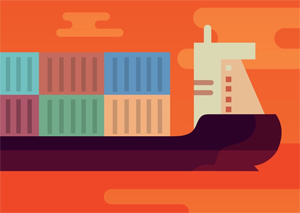A global survey showing that seafarers are generally more content with their work now than in the recent past is tempered by a new concern: fears that mariners may be on the hook for noncompliance as vessel operators adapt to the International Maritime Organization’s 2020 sulfur cap on fuel.
The survey, conducted by The Mission to Seafarers and covering the third quarter of 2019, shows an increase in overall happiness from 6.27 to 6.59 on a 10-point scale. “This is positive news,” according to the group. “It shows that it doesn’t have to be doom and gloom, that seafarers can share and be open about the good and bad they experience.”
Despite the increase in general happiness, several notable concerns were raised by some of the 2,500 mariners who took part in the survey. The most serious concern was the potential criminalization of sailors’ actions related to the new low-sulfur fuel regulations, and sanctions disputes between countries that could entangle mariners.
“They asked questions of who will protect them if things go wrong, and expressed concerns that they do not always have the information to make the right choices,” stated the report, written by Steven Jones for The Mission to Seafarers. Jones founded the Seafarers Happiness Index in 2015 and has conducted it quarterly since then.
Sailors’ apprehension stems from the implementation of the IMO’s 0.5 percent sulfur cap, which took effect on Jan. 1. The rule applies to all vessels on international voyages or on trips between two countries.
Many mariners fear they will be liable if vessels fail to meet this new standard. “The report indicates there is a widespread fear of blame for noncompliance, suggesting that some seafarers don’t feel prepared for the cap,” The Mission to Seafarers stated in a news release announcing the results of the latest survey.
Seafarers “spoke of being held responsible, and having to deal with whatever consequences that could entail, whether potential prosecution or incarceration,” Jones told Professional Mariner.
“Seafarers’ fear is real and we’ve expressed it in discussion at the IMO,” said Jordan Biscardo, communications director for the Seafarers International Union, referring to enforcement of the new sulfur limit. If a sailor is prosecuted for a ship violating the cap, “it is the company/manager’s responsibility to provide legal assistance to those impacted. While there are good companies that provide the necessary support, there (is) a plethora of shipping firms that fail to provide that support.”
To ensure that mariners don’t bear the brunt of unfair treatment, all stakeholders in the industry — particularly shipowners — need to step forward to fully understand how the regulations are enforced, advocates said.
“It is the companies, rather than the seafarers, who are unprepared for the cap, as it is only the companies that can make relevant decisions to ensure compliance,” Biscardo said. “There has to be sufficient deterrent for noncompliance to ensure that the level playing field is not undermined. However, this needs to be balanced against the need to ensure that all companies and seafarers are not penalized when efforts have been made to comply.”
Seafarer training is helpful, but Jones said those who enforce the rules and might prosecute mariners also need guidance “so they are fully availed of where problems lie, and to avoid any unfair treatment of crews.”
Another concern cited by Biscardo was the assessment of minor fines for violations. “Low fines could initiate verbal deals (by companies) to convince seafarers (masters and chief engineers) to cheat,” he said. “This kind of situation impacts all the crews and is extremely frustrating for everyone.”
Mariners’ fears are also related to problems with sanctions. Whether it involves vessels of certain flags or cargoes from nations subject to trade barriers, “it is the seafarers who have real concerns about what happens to them if they are caught in the crosshairs of global disputes,” Jones wrote.
Biscardo said the IMO has issued specific guidance about consistent implementation of the sulfur limit. “However, as the application of penalties is down to individual governments, there is concern that some will be far more draconian than others,” he said.

